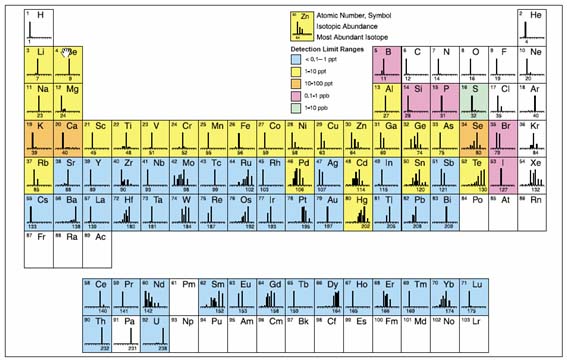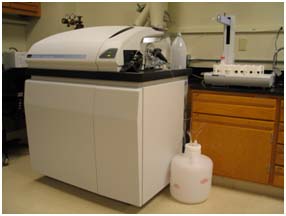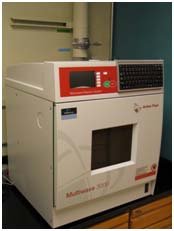
Inductively Coupled Plasma – Mass Spectrometry (ICP-MS) is a fast, precise, accurate and extremely sensitive technique for trace metal analysis. The ICP-MS instrument employs a mass spectrometer (MS) analyzer to detect the ions produced by inductively coupled plasma (ICP). ICP-MS was first developed in the early 80's and now is becoming the analytical tool of choice over most heavy metals detection techniques currently commercially available due to its sensitivity, speed of analysis, versatility and simplicity of operation.
ICP-MS can detect multi-elements and isotopics from parts per billion (ppb) to parts per trillion (ppt) levels in a variety of matrices, such as, sea water, aerosols, and dissolved geological, metallurgical, and biological samples.

The ICP-MS at Frank R. Seaver College of Science and Engineering is purchased from Perkin Elmer, which uses Dynamic Reaction Cell™ (DRC™) technology to eliminate polyatomic interferences, while innovative Axial Field Technology provides increased speed and stability. The ELAN DRC-e also uses a robust HF-resistant sample introduction system for worry-free performance in virtually any matrix.
The ELAN DRC-e instrument we have is an ideal choice for addressing the challenges of throughput and detection limits found in today's trace metal analysis on environmental and biological samples.

Our ICP-MS is also equipped with a sample digester. The Multiwave 3000 MF100-16 from Anton Paar is a versatile and modular microwave-assisted sample preparation system. It has a rotor with 16 tubes for fast and complete closed vessel digestion and extraction of organic or inorganic samples under high pressure and temperature rates.
- 16 closed digestion tubes (20 bar, up to 70 bar and 200°C)
- Pressure and temperature monitoring and auto-control
- Pre-set method library for various sample materials